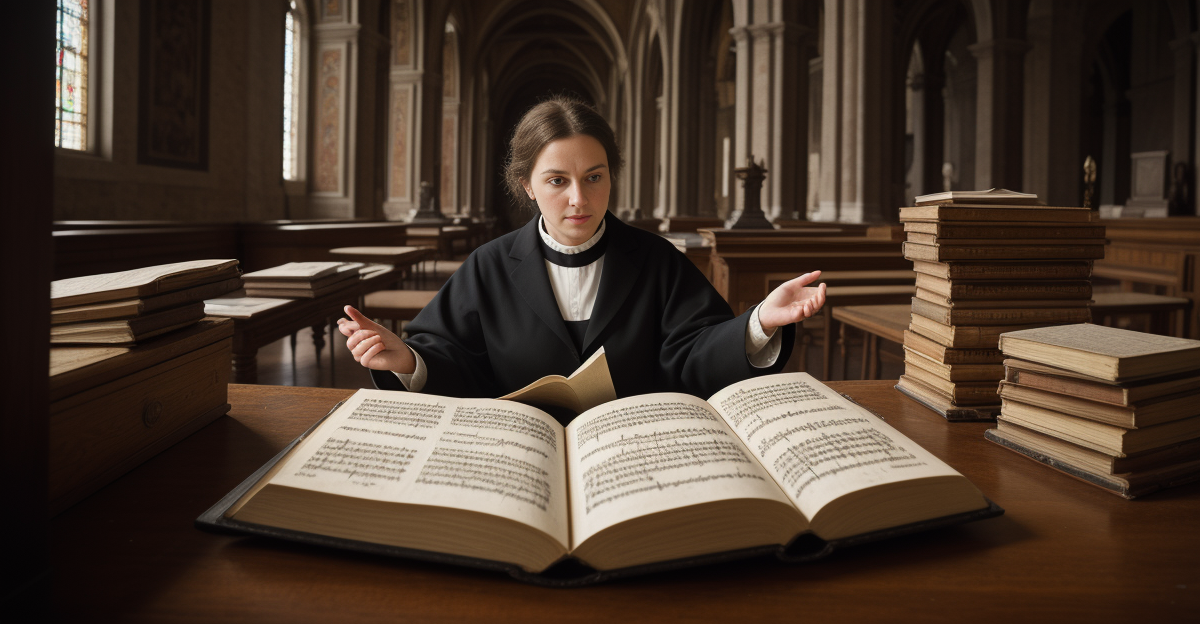
Explore the rumors surrounding Hildegard of Bingen's symphonies and whether the Vatican tried to era
Alright, let’s dive into a captivating historical mystery filled with soaring melodies, the might of the Church, and… the possibility of musical sabotage! We’re talking about Hildegard of Bingen, a 12th-century Benedictine abbess who was a composer, philosopher, mystic, and a true Renaissance woman long before the Renaissance even began. The question we’re exploring: Did the Vatican *actually* try to bury her symphonies? Let’s investigate! ### Hildegard’s Groundbreaking Contributions: A Symphony of Innovation Hildegard wasn’t just humming along; she composed complex, emotionally powerful music that was centuries ahead of its time. Think of her as a medieval musical innovator, pushing boundaries and defying expectations. Her compositional style was remarkably unique. She crafted hauntingly beautiful modal melodies, utilized wide vocal ranges that showcased incredible skill, and employed melismatic ornamentation – adding many notes to a single syllable – to give her music an ethereal quality. It was like adding shimmering light to every note. But there’s more! Hildegard also wrote *Ordo Virtutum*, a musical drama considered a proto-opera. Proto-opera! This wasn’t simply a choir singing hymns; it was a full-fledged production with characters, a plot (good versus evil, of course), and music that served to enhance the drama. In essence, Hildegard was writing musical theatre before Broadway was even a *dream*. ### The Church and Female Composers: A Complex Relationship Now, let’s address the challenges: being a woman in the Church during the Middle Ages was rarely easy. Opportunities for women to express themselves, especially through music, were severely limited. Nuns, like Hildegard, had more freedom than women outside the church, but even their roles were carefully controlled. During that time, music represented power, and power was largely held by men. Finding other prominent female composers from that era is like searching for a rare gem: difficult and often fruitless. Women weren’t generally encouraged to compose, let alone have their work widely shared. It was a patriarchal society, and the Church, like most institutions, reflected that reality. ### The Alleged Suppression: Unpacking the Rumors Okay, so *did* the Vatican try to erase Hildegard’s music? This is where the story becomes less clear. There’s no definitive proof, no official order from the Pope demanding her scores be destroyed. The idea of outright *suppression* is largely based on interpretation and the historical context. The argument goes something like this: Hildegard was a strong woman with a unique voice (both literally and figuratively). Her music challenged established norms, and her theological insights were sometimes… unconventional. Some believe that the male-dominated Church hierarchy might have felt threatened by her influence and sought to control her message. This *could* have manifested in a lack of promotion for her work, limited access to resources, or subtle discouragement. However, it’s important to remember that correlation doesn’t equal causation. The limited spread of her music could also be due to other factors, such as the practical difficulties of distributing manuscripts in the 12th century, or simply that her music, while brilliant, wasn’t created for widespread popular appeal. ### The Survival and Revival of Hildegard’s Music Here’s the inspiring part: despite the potential obstacles, Hildegard’s music *did* survive! Her manuscripts were carefully preserved within monastic communities, a testament to the enduring value placed on her work by those who knew it intimately. Then, in the late 20th century, something remarkable happened: Hildegard’s music was rediscovered! Scholars and musicians unearthed those ancient manuscripts, transcribed her scores, and began performing her music for modern audiences. Today, Hildegard of Bingen is celebrated as a visionary composer, a brilliant theologian, and a powerful voice from the past. Her music resonates with contemporary listeners because of its profound emotion, its spiritual depth, and its striking originality. So, what are your thoughts on this? Do you believe the Vatican actively suppressed Hildegard’s work, or was it simply a product of the times? Let me know in the comments! And while you’re at it, tell me: have you ever felt like your voice was being silenced? What did you do about it? Share your thoughts! Follow for more wild historical deep dives!
Enjoyed this? Check out our YouTube channel for video versions!
Enjoyed this? Check out our YouTube channel for video versions!



